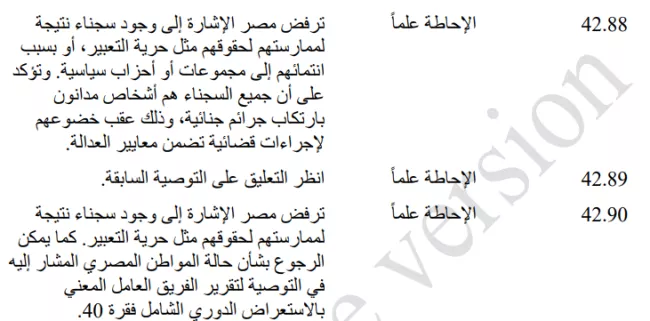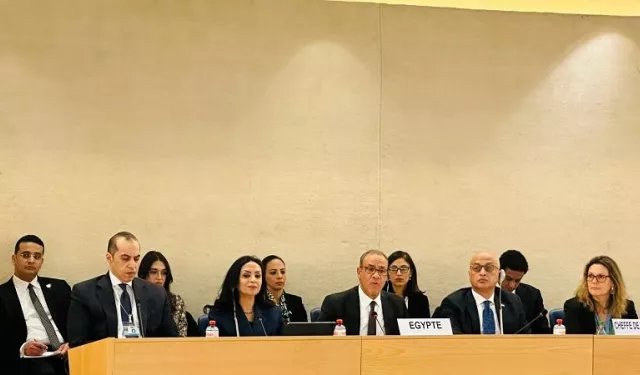The United Nations Human Rights Council in Geneva is holding a session on Wednesday to adopt the final report of Egypt’s Universal Periodic Review (UPR) on human rights, following the Egyptian government’s submission of its responses and comments to the recommendations received during the review session held in January.
In its June response to over 370 recommendations submitted by 137 countries during the January UPR session, Egypt fully accepted 77%, partially accepted 5%, and noted — effectively rejected — 18% recommendations.
The recommendations covered a broad spectrum of concerns, including torture, arbitrary detention, enforced disappearances, press freedom, the misuse of counterterrorism laws, and discrimination against women.
The final UPR report consolidates similar proposals into 343 recommendations.

The government denies the presence of prisoners held for exercising rights such as freedom of expression.The Egyptian Initiative for Personal Rights (EIPR) criticized the government’s reply, stating it repeated “the same rhetoric” used during the review and ignored “obvious realities,” instead painting a picture of progress and claiming some recommendations were already implemented.
“The government insists on a policy of denial,” EIPR said in a statement Tuesday, urging authorities to address widespread violations across all sectors of society.
Unlike in previous UPR cycles, Egypt did not explicitly reject any recommendations, instead using the phrase “noted” to signal non-acceptance.
The government cited legal or constitutional obstacles, national values, or inaccurate information as reasons for declining certain recommendations. Among those “noted” were calls to ratify international treaties like the International Convention for the Protection of All Persons from Enforced Disappearance and the Optional Protocol to the Convention Against Torture.

The government denies excessive use of pretrial detention.EIPR considers these rejections a reflection of Egypt's longstanding refusal to adopt binding international oversight, particularly mechanisms that include complaint or monitoring procedures.
Egypt also denied claims of arbitrary detention, restrictions on civil society, and criminalization of LGBTQ+ identities. The government asserted that anti-terrorism laws are not used against journalists, human rights defenders, or peaceful protesters, and that the constitution prohibits curbs on free expression.

The government denies imposing unjustified restrictions on civil society.However, Egypt ranks sixth globally in the number of imprisoned journalists in the past year, with 24 reporters behind bars, according to press freedom watchdogs.
Among them is Al Manassa’s cartoonist Ashraf Omar, who was arrested at his home on July 22, 2024. He remains in pretrial detention on charges of “spreading false news, misusing social media, and joining a group established in violation of the law.”
The government also refused recommendations to unblock independent media websites and ensure protection for rights groups and defenders. Al Manassa has been among the targets of these restrictions, facing repeated censorship. Its latest version, launched in July 2022, was swiftly blocked—marking the 13th instance of the site being taken offline.
Recommendations on protecting religious and ethnic minorities were also dismissed on the grounds that the constitution limits recognition to Islam, Christianity, and Judaism, effectively denying Bahai's and other minority faiths full civil rights.
“Despite constitutional guarantees of equality, the state continues to discriminate,” EIPR said, highlighting barriers to marriage, burial, and religious practice for unrecognized groups.
EIPR had submitted five reports ahead of the UPR session, documenting abuses within the justice system, against human rights defenders and journalists, and systemic violence against women and digital rights. The organization also released a commentary titled “Parallel Reality,” critiquing the government’s official narrative.
